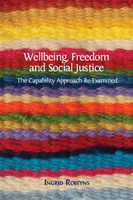Wellbeing, Freedom and Social Justice
The Capability Approach Re-Examined
| dc.contributor.author | Robeyns, Ingrid | |
| dc.date.accessioned | 2018-01-16 23:55 | |
| dc.date.accessioned | 2017-12-01 23:55:55 | |
| dc.date.accessioned | 2018-01-16 00:00:00 | |
| dc.date.accessioned | 2020-04-01T13:14:27Z | |
| dc.date.available | 2020-04-01T13:14:27Z | |
| dc.date.issued | 2017 | |
| dc.identifier | 641879 | |
| dc.identifier | OCN: 1018396831 | en_US |
| dc.identifier.uri | http://library.oapen.org/handle/20.500.12657/30821 | |
| dc.description.abstract | "Notions such as wellbeing, freedom, and social justice are integral to evaluating social progress and developing policies. One increasingly influential way to think about these concepts is the capability approach, a theoretical framework which was pioneered by the philosopher and economist Amartya Sen in the 1980s. In this book Ingrid Robeyns orientates readers new to the capability approach through offering an explanation of this framework. Wellbeing, Freedom and Social Justice also endeavors to resolve historical disputes in the literature and thus will be equally engaging to those familiar with the field. The author offers a novel and illuminating account of how the capability approach can be understood in a variety of academic disciplines and fields of application. Special attention is paid to clarifying misunderstandings that have been caused by different disciplinary assumptions and the interpretive consequences they have for our consideration of the capability approach. Robeyns argues that respecting the distinction between the general capability approach, and more specific capability theories or applications, helps to clear up confusion and misinterpretation. In addition, the author presents detailed analyses of well-known objections to the capability approach, and also discusses how it relates to other schools of analysis such as theories of justice, human rights, basic needs, and the human development approach. Wellbeing, Freedom and Social Justice offers an original and comprehensive account of the field. The book will appeal to scholars of the capability approach as well as new readers looking for an interdisciplinary introduction." | |
| dc.language | English | |
| dc.subject.classification | thema EDItEUR::J Society and Social Sciences::JH Sociology and anthropology::JHB Sociology::JHBC Social research and statistics | en_US |
| dc.subject.classification | thema EDItEUR::K Economics, Finance, Business and Management::KC Economics::KCP Political economy | en_US |
| dc.subject.classification | thema EDItEUR::K Economics, Finance, Business and Management::KC Economics::KCV Economics of specific sectors::KCVK Welfare economics | en_US |
| dc.subject.other | social justice | |
| dc.subject.other | capability approach | |
| dc.subject.other | economic disparity | |
| dc.subject.other | freedom | |
| dc.subject.other | public policy | |
| dc.subject.other | social science | |
| dc.subject.other | wellbeing | |
| dc.subject.other | Human rights | |
| dc.subject.other | Martha Nussbaum | |
| dc.subject.other | Welfare economics | |
| dc.title | Wellbeing, Freedom and Social Justice | |
| dc.title.alternative | The Capability Approach Re-Examined | |
| dc.type | book | |
| oapen.identifier.doi | 10.11647/OBP.0130 | |
| oapen.relation.isPublishedBy | 23117811-c361-47b4-8b76-2c9b160c9a8b | |
| oapen.collection | ScholarLed | |
| oapen.pages | 266 | |
| oapen.remark.public | Relevant Wikipedia pages: Capability approach - https://en.wikipedia.org/wiki/Capability_approach; Human rights - https://en.wikipedia.org/wiki/Human_rights; Martha Nussbaum - https://en.wikipedia.org/wiki/Martha_Nussbaum; Social norm - https://en.wikipedia.org/wiki/Social_norm; Welfare economics - https://en.wikipedia.org/wiki/Welfare_economics | |
| oapen.identifier.ocn | 1018396831 |

